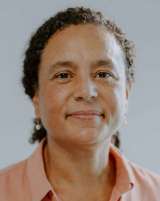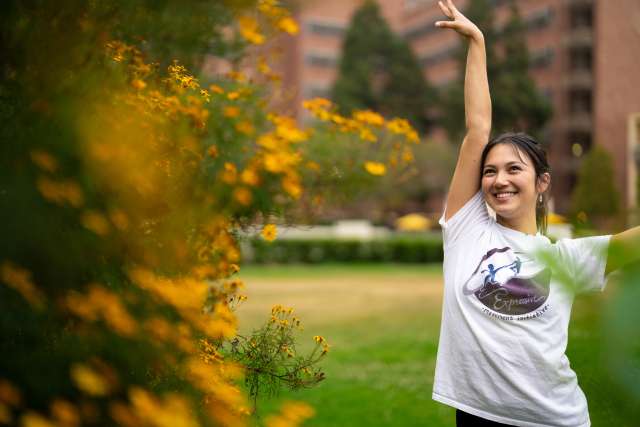Looking out at the empty green asphalt rooftop, its views of Beverly Hills and the Pacific Ocean interrupted by jail-like bars, Helena Hansen, MD, PhD, director of the Semel Institute for Neuroscience and Human Behavior, envisions a lush green space at the forefront of mental health research.
Lined with native plants and frequented by birds and butterflies, with group seating and small, private treatment rooms, the top deck of the Semel Institute is being reimagined as a state-of-the-art living laboratory to study Ecological Medicine and psychedelic therapies. It will be the first of its kind in a biomedical setting.
The project represents “an audacious vision that many of us have for reinventing biomedicine,” says Dr. Hansen, also co-founder and director of Project ReConnect, UCLA’s Ecological Medicine and Psychedelic Studies Initiative.

“Rather than focusing further inward, at the exclusively molecular or neuronal level (we want) to actually turn outward,” Dr. Hansen said at a recent symposium presented by Project ReConnect, “to how we can foster connections with each other, foster connections with the natural world with plants and animals, and where necessary, bring the natural world of plants and animals into the biomedical clinic.”
Dr. Hansen’s passion for the power of connection – with nature, with other people, and within ourselves – is the driving force of Project ReConnect, says co-founder and executive director, Landon Pollack. He calls Dr. Hansen a “force for good who brings a relational approach to mental health, with a focus on social networks as much as neuronal networks.”
Dr. Hansen credits Pollack, an adviser and donor to nonprofits that support nature connection and health, as being the “human catalyst” behind Project ReConnect. It was he who suggested pairing Ecological Medicine research with psychedelic medicine as a unique differentiator for UCLA Health, she says, as they both center on connection.
“If we take these two modalities that share a lot in common and put them together, does that enhance their impact?” Dr. Hansen asks. “That’s an open question, and that’s what we’re gearing up to study. That’s what the living laboratory will help us to study.”
For example, researchers can look at how interacting with plants and animals in the living laboratory affects traditional therapy sessions and psychedelic medicine sessions. They can also explore how Ecological Medicine affects overall mental health and well-being.
“There are many different methods and many different lenses we can apply, both with the psychedelics and with the interaction with plants and animals,” Dr. Hansen says.
What is Ecological Medicine?
Ecological Medicine is a relatively new field of inquiry into the relationships between populations, communities, individuals and Earth’s ecosystems. It seeks to explore how people relate and connect to the natural world, and to promote physical and mental health by supporting these connections.
A cultural anthropologist and psychiatrist, Dr. Hansen has long been interested in the relationship between social environments and human biology. She was first exposed to the concept of ecological medicine (though it wasn’t called that at the time) while practicing psychiatry at Bellevue Hospital in New York. A colleague started a garden outside the hospital with donated soil, plants and seeds, and cultivated it alongside patients and other staff members. The project turned a forgotten patch of ground into a flourishing array of plants, vegetables and flowers – and a place for connection and discovery.
“For many people, just having contact with soil, plants and animals – that in itself was beneficial,” Dr. Hansen recalls. “For others, there were conversations with their peers, with their therapist, out in the garden that wouldn’t have happened in a room one-on-one with the door closed. I saw that being out there with the garden was really game-changing for many people, and that the nature contact was vitally important.”
Psychedelic studies at UCLA
Charles Grob, MD, director of child and adolescent psychiatry at Harbor-UCLA Medical Center and a professor of clinical psychiatry at the David Geffen School of Medicine at UCLA, has been studying the therapeutic applications of psychedelics, such as psilocybin and MDMA (or ecstasy), for more than three decades. He’s currently overseeing three clinical trials with psychedelics, among nearly a dozen underway at UCLA Health.
Interest and excitement about the therapeutic potential of psychedelics has skyrocketed in recent years. Studies have found psilocybin and MDMA can be effective treatments for a number of mental health conditions, including treatment-resistant depression and post-traumatic stress disorder. However, an advisory panel to the U.S. Food & Drug Administration recently voted against the use of MDMA for the treatment of PTSD, saying more safeguards are needed.
Dr. Grob’s research has explored the role of psychedelics in reducing social anxiety in autistic adults, treating anxiety in people with advanced-stage cancers, and how they might help alleviate chronic pain.
“Many of these investigations exploring the clinical utility of psychedelics have reported very encouraging outcomes with degrees of clinical improvement often far exceeding expected responses to long-established conventional treatment models,” Dr. Grob says. “Further work awaits that will help us more fully understand the range of effects of psychedelics, particularly in regard to establishing effective safety and ethical parameters. Nevertheless the progress made thus far has generated a notable positive momentum within psychiatry, attracting the interest and active participation of a growing number of leaders of the field as well as some of the best and brightest of the next generations of academic psychiatrists and psychologists.”
Gardens galore
Funding is underway to develop the rooftop deck, which will be reserved strictly for psychedelic and ecological medicine studies. Meanwhile, a publicly accessible green space is being created on a lower-level deck at the Semel Institute. This semi-private space – bigger than a basketball court – will be transformed into a communal space and community garden, Dr. Hansen says.
“We hope it will draw patients, family members of patients and so forth, where they can get involved with cultivating the soil, and where we can have activities like mindfulness meditation, yoga and movement,” she says. “We think of it as a health-promoting space where plants and animals will be a big part of the attraction.”
What kinds of animals? Pollinators, birds, “and maybe some squirrels,” Pollack says.
Planning and fundraising efforts are underway for both the public-access community garden and the rooftop living laboratory. The UCLA Ecological Medicine & Psychedelic Studies Initiative is set to hold a public symposium in November 2024] where people can learn more about these research areas at UCLA Health.



